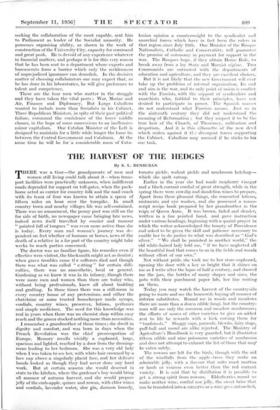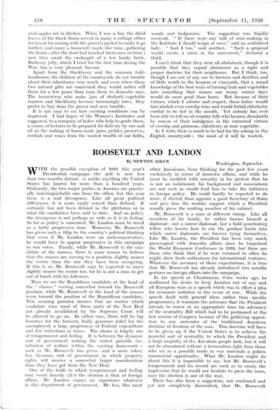THE HARVEST OF THE HEDGES
By S. L. BENSUSAN
THERE was a time—the grandparents of men and women still living could talk about it—when trans- port facilities were practically unknown, when indifferent roads depended for support on toll-gates, when the pack- horse acted as carrier for country folk and the mail coach with its team of four was known to attain a speed of fifteen miles an hour over the turnpike. In small country town and nearby villages life was self-contained. There was no amusement, the penny post was still on the far side of birth, no newspaper came bringing late news, indeed news itself travelled by courier and rumour " painted full of tongues " was even more active than she is today. Every man and woman's journey was de- pendent on feet whether of humans or horses, news of the death of a relative in a far part of the country might take weeks to reach parties concerned.
The doctor was no familiar figure, his remedies even if effective were violent, the blacksmith might act as dentist ; when grave troubles came tte sufferers died and though there was what was called " eitting " for certain diffi- culties, there was no anaesthetic, local or general. Gardening as we know it was in its infancy, though there were more men and women than there are today who, without being professionals, knew all about budding and grafting. In those times there was a still-room in every country house of any pretensions, and either the chatelaine or some trusted housekeeper made syrups, cordials, country wines, preserves, lotions, perfumes and simple medicines. The need for this knowledge was real in years When there was no chemist shop within easy reach and the grocer stocked nothing more than necessities.
I remember a grandmother of those times ; she dwelt in dignity and comfort, and was born in days when the French Revolution was the chief preoccupation of Europe. MeMory recalls vividly a cupboard, large, spacious and lighted, reached by a door from the dressing- room leading to her bedroom. She was a very old lady when I Was taken to see her, with white hair crowned' by a lace cap above a singularly placid face, and her delicate hands- looked as though they had never done any hard work. But at certain seasons she would descend in state to the kitchen, where the gardener's boy would bring all manner of autumn harvest, and' she would prepare jelly of the crab-apple, quince and rowan, with .elder wines and cordials, lavender water, sloe gin, damson brandy, tomato pickle, walnut pickle and mushroom ketchup— which she spelt catsup.
Earlier in the year she had made raspberry vinegar and a black currant cordial of great strength, while in the spring there were cowslip and dandelion wines to prepare. Apart from these .pleasant things, she concocted lotions, ointments and eye washes, and she possessed a manu- script recipe book prepared by her grandmother in the reign of Queen Anne. It was brown, faded and slender, written in a fine pointed hand, and gave instruction under various headings, beginning with a quaint prayer in which the writer acknowledged the bounty of Providence and asked to be given the skill and patience necessary to enable her to do justice to what was described as " God's silver." " We shall be punished in another world," the old white-haired lady told me, " if we have neglected all the beautiful food that comes to us in the fields and woods without effort of our own."
Not without pride, she took me to her store-cupboard, opening the door with a key so bright that it shines on me as I write after the lapse of half a century, and showed me the jars, the bottles of many shapes and sizes, the pots with their parchment paper lids, her fine writing on them.
Today you may watch the harvest of the countryside going to waste and see the housewife buying all manner of inferior substitutes. Round me in woods and meadows there are more than a dozen edible fungi, but the country- man will use only the common and meadow mushrooms; the efforts of scores of other varieties to give an added zest to life he rewards with a kick cursing them for "toadstools." Shaggy caps, parasols, blewits, fairy rings, puff-ball and morel are alike rejected. The Ministry of Agriculture's Handbook is very guarded, but it illustrates fifteen edible and nine poisonous varieties of mushroom and does not attempt to exhaust the list of those that may be eaten safely.
The rowans are left for the birds, though with the aid of. the windfalls from the apple-trees they make an admirable jelly, with a flavour that suits roast mutton or lamb or venison even better than the red currant variety. It is said that by distillation it is possible to get a strong spirit from rowans. Elderberries round .us make neither wine, cordial nor jelly, the sweet briar that can be translated into a conserve or a wine goes untouched, crab-apples rot in ditches. When I was a boy the dried leaves of the black thorn served in many a eottake either for tea or for mixing with the grocer's packet to mate it go farther, and many a housewife made sloe wine, gathering the berries after the frost had touched them once or twice ; now they await the onslaught of a few' hardy birds. Barberry jelly, which I tried for the first time during the War, has a very pleasant flavour.
Apart from the blackberry and the common field- mushroom, the children of the countryside do not trouble about their inheritance very much, and even where these two natural gifts are concerned they would rather sell them for a few pence than turn them to domestic uses. The housewives who make jam of rhubarb, vegetable marrow and blackberry become increasingly rare ; they prefer to buy from the grocer and save trouble.
It is not easy to see how existing conditions can be improved. 'I had hopes of the Women's Institutes and suggested, to a company of ladies who help to guide them, a course of lectures to be prepared for delivery by one and all on the making of home-made jams, pickles, preserves, cordials and wines from the wasted wealth of our fields, woods and hedgerowS: The suggestion was frigidly received. " If there were any talk of wine-making in the Institute I should resign at once," said an acidulated lady: "'And I too," said another. " Such a proposal would create a crisis in the movement," declared a third.'
I can't think that they were all abstainers, though it is possible that they regard abstinence as a right and proper doctrine for their neighbours. But I think, too, though I am not of any use to brewers and distillers and of little worth to the keepers of vineyards, that a sound knowledge of the beSt ways of turning fruit and vegetables into something that warms our weary winter. days would do more good than harm. But because of their virtues, which I admire and respect, those ladies would' fain abOlish even cowslip wine and would forbid elderberry cordial to be hot in the mouth. Yet nobody has ever been able to tell me of country folk who became drunkards" by reason of their indulgence in the extracted virtues of cowslip and primrose,.. elderberry or root vegetable. .
As I write there is much to be had for the asking in the English countryside:. the most of it will be wasted.













































 Previous page
Previous page